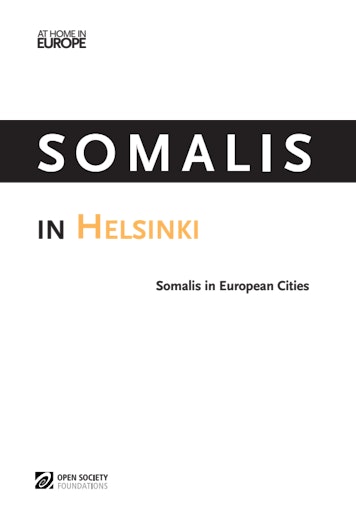Somalis in Helsinki Value Quality of Life in City but Challenges Remain in Employment and Education
Somalis in Helsinki value the health services, security and social protection offered by the city but employment difficulties, including failure to find a job and discrimination in daily life, are damaging Somalis’ sense of belonging in Helsinki, according to research launched today.
Somalis in Helsinki, a report by the Open Society Foundations’ At Home in Europe project, explores the experiences of Somalis in employment, education, health, political participation, and policing as well as their sense of identity and belonging in Helsinki.
“Education and employment are essential if Somalis in Helsinki are to be equal and active members of society and though early integration policies have laid a good groundwork, more can now be done to overcome the challenges identified in this research,” commented Nazia Hussain, director of the Open Society Foundations’ At Home in Europe project.
The report recommends that the city of Helsinki give the situation of Somalis and other ethnic minority groups more focused attention and consider appointing institutional agencies who can monitor discrimination more effectively and who will also establish closer cooperation with immigrant and minority communities.
"The increase in Helsinki’s migrant population can be a key element for positive growth in the city. The City of Helsinki wants to be an active forerunner in combating discrimination against Somalis and any other groups. We want Helsinkians with a Somali background, and future generations, to feel at home in a diverse Helsinki,” commented Jussi Pajunen, the Mayor of Helsinki.
The report also finds:
- The policy of socially mixed housing is viewed positively by Somalis in Helsinki who are largely satisfied with the quality of housing and availability of services.
- Somalis in Helsinki feel there are strong negatives attitudes against Somalis which weakens their sense of belonging to the wider society; though there is a sense of community amongst the Somali community itself.
- Early practical guidance on the Finnish education system would be beneficial to both parents and teachers in order to improve the educational outcomes of Somali and other minority children.
- Acquiring citizenship, as over 40 percent of Somalis in Finland have, is an important tool for integration but must be accompanied by social and economic processes that will improve the path to full integration and belonging.
The report also recommends that the city of Helsinki and state provider agencies raise awareness on the issue of belonging, the changing ethnic landscape of Finnish society and the multiplicity of identities that are emerging in Finland.
Notes
- Somalis in Helsinki is part of a seven city research series, Somalis in European Cities, by the Open Society Foundations’ At Home in Europe project which examines the realities of people from Somali backgrounds in Amsterdam, Copenhagen, Helsinki, Malmo, Leicester, London, and Oslo.
- The report used qualitative research methods, including interviews with key stakeholders at the city and national level and focus group discussions with Somali residents, conducted from the beginning of December 2012 through to the end of February 2013
- The At Home in Europe project, part of the Open Society Foundations, works to advance equality for groups that are excluded from mainstream civic, political, and cultural life in a changing Europe. At Home in Europe advocates for change with grassroots civil society groups, policy makers, practitioners and residents in 17 cities in Western Europe.
- The report “Somalis in Helsinki” is launched by the Open Society Foundations in partnership with the Helsinki City Council and Department of Social Research, University of Helsinki. The researchers were Marja Tiilikainen and Abdirashid Ismail. Open Society Foundations are solely responsible for the content of the report.
Download
-
Press Release (Finnish) (200 Kb pdf file)
Download the press release in Finnish.
